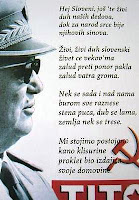The National Anthem of Australia

A prolific composer, Scottish-born Peter Dodds McCormick was moved to compose a national anthem for Australia when, having attended a concert of the world's anthems, there was no anthem for Australia. His original lyrics heavily emphasized Australia's ties to Britain (as Australia was a British colony at the time). Upon Australia's inauguration as a separate Commonwealth on January 1, 1901, the song was performed, but the British "God Save the Queen" was still the official anthem of Australia. At this time, the third verse of McCormick's original work was changed.
While "Advance Australia Fair" remained popular with the people in the decades following, no official national anthem other than "God Save the Queen" was declared. In 1974 the Australian Bureau of Statistics conducted a national opinion poll of 60,000 and in 1977 a plebiscite for a national song was conducted. On each occasion, Advance Australia Fair was the preferred option (the other choices were the existing anthem "God Save the Queen" and the popular national songs "Song of Australia" and "Waltzing Mathilda"), and it was in consideration of such support that Advance Australia Fair was proclaimed as the national anthem by the Governor-General on 19 April 1984. From the original five-verse song, only the first and third verses are the official national anthem, with slight changes to make the song more gender-inclusive.
Peter Dodds McCormick (1834? – 30 October 1916), a Scottish-born schoolteacher, was the composer of the Australian national anthem Advance Australia Fair.
Born the son of a seaman at Port Glasgow, Scotland, he arrived in Sydney (at that time the principal city of the British colony of New South Wales) in 1855. Details of his earlier years, prior to his arrival in Australia, are shadowy. He spent most of his life employed by the NSW Education Department. In 1863 he was appointed teacher-in charge of at St Mary's National School and went on to teach at the Presbyterian denominational school in the Sydney suburb of Woolloomooloo in 1867. He then moved to Dowling Plunkett Street Public School in 1878 where he remained until 1885.
McCormick was heavily involved in the Scottish Presbyterian Church and was active in a number of community and benevolent organisations. He began his involvement with Sydney's St Stephen's Church as a stonemason, working on the now demolished Phillip Street Church (where Martin Place now stands). The Rev Hugh Darling was so impressed with his singing on the job he asked him to join the choir. McCormick's musical ability led him to becoming the precentor of the Presbyterian Church of NSW, which gave him the opportunity to conduct very large massed choirs. He was also convenor of the Presbyterian Church Assembly's Committee on Psalmody. Also a talented composer, he published around 30 patriotic and Scottish songs, some of which became very popular. Included in his collected works was Advance Australia Fair, which was first performed in public by Andrew Fairfax at the St Andrew's Day concert of the Highland Society on 30 November 1878.
McCormick died in 1916 at his home in the Sydney suburb of Waverley and he was buried at Rookwood Cemetery. He had no children; he was survived by his second wife Emma. His obituary in the Sydney Morning Herald stated: "Mr. McCormick established a reputation with the patriotic song, Advance Australia Fair, which ... has come to be recognised as something in the nature of an Australian National Anthem".
The postal card above features the lyrics of the Australian anthem "Advance Australia Fair"






